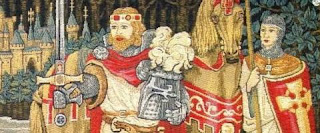OK, back. But it's freezing cold in this castle, so i settled for some hot spiced wine instead. Please ignore all subsequent spelling errors. Thank you kindly.
On to the Character of the Week: Let us now consider Lancelot du Lac. Lance arrives "from far-off France", having heard The Call to join King Arthur and the knights of the Round Table. His sincerity and dedication immediately win Arthur's heart,
You shall be my right-hand knight, Lance, but on my left. Never did get that straight, whot?
but pretty much everything else about him drives everyone else up the wall: he's FRENCH, but that's only the beginning! He is the prototype Captain America: outrageously strong, fit, bold,
"I've never lost in battle or game; I'm simply the best by far....."
and so Pure of Heart that he makes the Eagle Scouts look like the Chippendales.
"And here I stand as pure as a pray'r
Incredibly clean, with virtue to spare
The godliest man I know"
"The soul of a knight should be a thing remarkable
His heart and his mind as pure as morning dew
With a will and a self-restraint
That's the envy of ev'ry saint
He could easily work a miracle or two"
So what's the problem here?
The problem is that Lance can't sustain his purity, when push comes to shove.
"To love and desire he ought to be unsparkable
The ways of the flesh should offer no allure"
I love how bored the squire appears to be. Rehearsals get me feeling like that sometimes, too.
Now, here's the thing: Lancelot is not some boastful, stuck up blowhard (think Gaston, for example, in Beauty & The Beast). He really IS everything he says he is, but he's tone-deaf about it sounds to others. He immediately riles the Queen (hate at first sight, who knew that trope was so old?!), who conspires to have him defeated at the jousts. Things do not, however, go as planned, and in the end he makes good on his most far-fetched boast:
So what's the problem here?
The problem is that Lance can't sustain his purity, when push comes to shove.
Lancelot has lived his life as a man apart; obsessively devoted to bettering himself - trying to perfect himself - he admits to having shut out all others. As long as he remains in his bubble, he's good to go, remaining as saintly as he wishes to be.
We needed a cat here, don't you think?
But in Camelot, through his fierce devotion to Arthur, he is exposed to Queen Guenivere, and he soon discovers that he is NOT the equal of his ideals:
Lancelot falls in love with Guenevere, and even though - as befits the time and place - there is no indication that they ever consumate that love, Lancelot has, in one fell stroke, pretty much committed the ultimate betrayal:
Fallen in love with a married woman
Who is the wife of his best friend
And who is the Queen of his country.
Talk about the trifecta.
I wonder quite a bit about what happens to Lancelot after the events depicted in the show. Does he live the rest of his life consumed with shame? Full of self-hatred and regret? Does he forgive himself, or try to find salvation via some noble quest? There is that whole Holy Grail thing, but that's out of the scope of the show.
Here's something to contemplate in your spare time: is it possible that Lance was somewhere along the spectrum of Asperger's disease, just a little bit autistic? Here's what Wikipedia has to say about the disorder: Asperger syndrome (AS), also known as Asperger's syndrome, Asperger disorder (AD) or simply Asperger's, is an autism spectrum disorder
(ASD) that is characterized by significant difficulties in social
interaction and nonverbal communication, alongside restricted and
repetitive patterns of behavior and interests.
There is his single-minded, obsessive devotion to achieving perfection (and to perfecting Chivalry, as well). There is his difficulty in understanding the emotions and reactions of others. His social isolation.
If this is so, then his attraction to Jenny is all the more excruciating, on an epic scale. King Arthur is a tragic figure in many ways, but when you think about it..... it's really Lancelot whose story breaks your heart.
Coming up next: Camelot on the Couch looks at his majesty KING ARTHUR!
Tickets and performance information at LOGON Hotline 08-6414081 or at
https://www.tixwise.co.il/he/camelot
Performances in Beer Sheva, Jerusalem, Kfar Saba, Netanya, Rechovot, Haifa, and Modi'in










